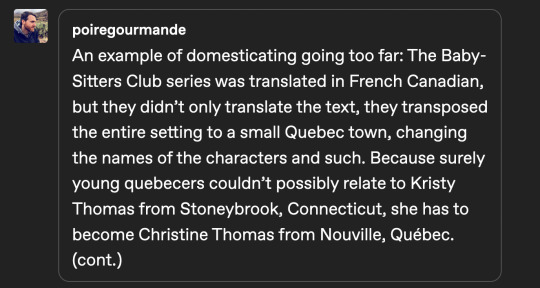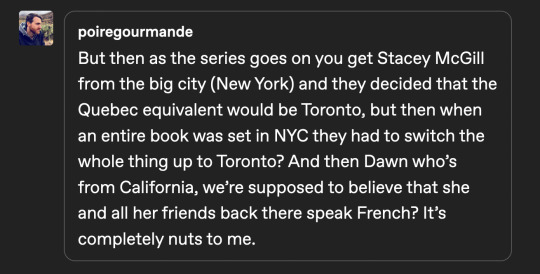#e.g. ancient greek classics (as someone mentioned on that other post) which have often been too heavily foreignised in translation
Explore tagged Tumblr posts
Text
(replying to this post)


That’s a good example of the perils of domesticating translations! It seems obvious that if you try to adapt an ongoing series by changing a main character’s hometown so it’s more local, at some point you’re going to run into problems, like a whole book where they visit their hometown, which will need an in-depth rewrite so it stays coherent.
The France-French translations of Baby-Sitters Club were still set in the US, so the characters had names that were slightly domesticated so as not to frighten French children, but not so much that it wouldn’t make sense for these girls to be American—e.g. Mary Ann became Mary-Anne vs. Anne-Marie in Québec French, and Dawn and Stacey became Carla and Lucy, which still sounds American to a French kid, but not as unconscionably American as their original names. (Part of it is finding names that won’t be difficult to pronounce—but the Famous Five kids had easily-pronounced names like Julian and Dick, and they still ended up heavily Frenchified, into François and Michel. And the books were set in Brittany in the French translations, instead of England, even though French kids could have handled reading a story that was set five metres to the left.)
I remember feeling puzzled about Nancy Drew at one point, because she’s such a household name in anglo literature and I’d never ever heard of her, so I was like, we’ve translated every other popular anglo series, why have I never seen a Nancy Drew book in a French library? And then I discovered that Alice Roy from the “Alice” book series in French was, in fact, Nancy Drew. It blew my mind—Nancy Drew is Alice!! omg, I did know her this whole time. I read somewhere that the French translation re-named her because French kids would have no idea how to pronounce “Drew” and because they would be more likely to associate “Nancy” with the French city of the same name, so it wouldn’t feel anglo enough. So, amusingly, it was a mix of domesticating and foreignising.
One type of domestication that’s regrettably popular in children’s literature is “temporal” domestication—when you re-translate older books to modernise the language and remove references that would “confuse” today’s kids (not talking about changing aspects of the books that wouldn’t fly with today’s sensibilities, that’s another discussion.) In revised editions of the Famous Five books in the UK, “shall / shan’t” were changed to “will / won’t”, dated words like “horrid” became “horrible”, “trunks” -> “suitcases”, etc. It’s a form of domesticating translation—from 1950s English to modern English. Personally I’m not a fan of it, because in a lot of instances, “modernising” prose for children is synonymous with pruning it and dumbing it down.
In French children’s literature spatial domesticating is losing steam while this kind of temporal domesticating is on the rise—we now feel like French kids can handle reading about an English boy named Julian who lives in England, rather than making the story about François in Brittany, but apparently kids can’t handle reading about a boy who lives in the 1950s and speaks accordingly. In recent re-translations of the Famous Five books they changed the passé simple conjugations to the less complex present, and the “nous” to “on” in the kids’ dialogue among other things, to make the text less formal, more modern—and simpler. The Spanish revised editions have examples of both trends—George calls her father “Padre” in the original translation and “Papá” in the modern one (temporal domesticating—the UK reprints do the same thing, changing “Father” to “Dad”); the kids having tea was initially translated as “tomar el té”, while the new translation changed it to “merendar” (spatial domesticating—and sure, it’s a similar enough concept, but it erases cultural differences. If you’re reading about English kids you can accept that they refer to their snack time as la hora del té rather than la merienda...)
Idk, I think kids who enjoy reading can handle books about fictional children that don’t live and talk just as they do; identifying with people who are quite different from you is part of the fun of reading. I remember reading as a kid the Comtesse de Ségur children’s books which were written under Napoléon III, and the 19th century language was a delightful aspect of them—the fact that little kids my age used imperfect subjunctive in casual conversation was hilarious to me. I was saying in my previous post that domesticating your translation too much evinces a lack of respect for your reader’s ability to handle unfamiliar concepts, and I think we should try to have a little more respect for children in that regard.
#some amount of temporal domesticating can be good so you don't have a completely different experience of a text than#a person from the time period when it was written#e.g. ancient greek classics (as someone mentioned on that other post) which have often been too heavily foreignised in translation#and end up being perceived as abstruse or academic when they initially told a story that could be enjoyed by the average person#but come on let's not do this for texts that have been published in our parents' lifetimes#anyway i'm sorry this is supposed to be a llama blog
3K notes
·
View notes
Text
#some amount of temporal domesticating can be good so you don't have a completely different experience of a text than#a person from the time period when it was written#e.g. ancient greek classics (as someone mentioned on that other post) which have often been too heavily foreignised in translation#and end up being perceived as abstruse or academic when they initially told a story that could be enjoyed by the average person#but come on let's not do this for texts that have been published in our parents' lifetimes#anyway i'm sorry this is supposed to be a llama blog (hedgehog-moss)
This is so fascinating to hear about and learn, holy shit.
(replying to this post)


That’s a good example of the perils of domesticating translations! It seems obvious that if you try to adapt an ongoing series by changing a main character’s hometown so it’s more local, at some point you’re going to run into problems, like a whole book where they visit their hometown, which will need an in-depth rewrite so it stays coherent.
The France-French translations of Baby-Sitters Club were still set in the US, so the characters had names that were slightly domesticated so as not to frighten French children, but not so much that it wouldn’t make sense for these girls to be American—e.g. Mary Ann became Mary-Anne vs. Anne-Marie in Québec French, and Dawn and Stacey became Carla and Lucy, which still sounds American to a French kid, but not as unconscionably American as their original names. (Part of it is finding names that won’t be difficult to pronounce—but the Famous Five kids had easily-pronounced names like Julian and Dick, and they still ended up heavily Frenchified, into François and Michel. And the books were set in Brittany in the French translations, instead of England, even though French kids could have handled reading a story that was set five metres to the left.)
I remember feeling puzzled about Nancy Drew at one point, because she’s such a household name in anglo literature and I’d never ever heard of her, so I was like, we’ve translated every other popular anglo series, why have I never seen a Nancy Drew book in a French library? And then I discovered that Alice Roy from the “Alice” book series in French was, in fact, Nancy Drew. It blew my mind—Nancy Drew is Alice!! omg, I did know her this whole time. I read somewhere that the French translation re-named her because French kids would have no idea how to pronounce “Drew” and because they would be more likely to associate “Nancy” with the French city of the same name, so it wouldn’t feel anglo enough. So, amusingly, it was a mix of domesticating and foreignising.
One type of domestication that’s regrettably popular in children’s literature is “temporal” domestication—when you re-translate older books to modernise the language and remove references that would “confuse” today’s kids (not talking about changing aspects of the books that wouldn’t fly with today’s sensibilities, that’s another discussion.) In revised editions of the Famous Five books in the UK, “shall / shan’t” were changed to “will / won’t”, dated words like “horrid” became “horrible”, “trunks” -> “suitcases”, etc. It’s a form of domesticating translation—from 1950s English to modern English. Personally I’m not a fan of it, because in a lot of instances, “modernising” prose for children is synonymous with pruning it and dumbing it down.
In French children’s literature spatial domesticating is losing steam while this kind of temporal domesticating is on the rise—we now feel like French kids can handle reading about an English boy named Julian who lives in England, rather than making the story about François in Brittany, but apparently kids can’t handle reading about a boy who lives in the 1950s and speaks accordingly. In recent re-translations of the Famous Five books they changed the passé simple conjugations to the less complex present, and the “nous” to “on” in the kids’ dialogue among other things, to make the text less formal, more modern—and simpler. The Spanish revised editions have examples of both trends—George calls her father “Padre” in the original translation and “Papá” in the modern one (temporal domesticating—the UK reprints do the same thing, changing “Father” to “Dad”); the kids having tea was initially translated as “tomar el té”, while the new translation changed it to “merendar” (spatial domesticating—and sure, it’s a similar enough concept, but it erases cultural differences. If you’re reading about English kids you can accept that they refer to their snack time as la hora del té rather than la merienda…)
Idk, I think kids who enjoy reading can handle books about fictional children that don’t live and talk just as they do; identifying with people who are quite different from you is part of the fun of reading. I remember reading as a kid the Comtesse de Ségur children’s books which were written under Napoléon III, and the 19th century language was a delightful aspect of them—the fact that little kids my age used imperfect subjunctive in casual conversation was hilarious to me. I was saying in my previous post that domesticating your translation too much evinces a lack of respect for your reader’s ability to handle unfamiliar concepts, and I think we should try to have a little more respect for children in that regard.
3K notes
·
View notes